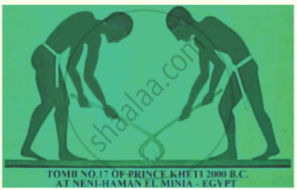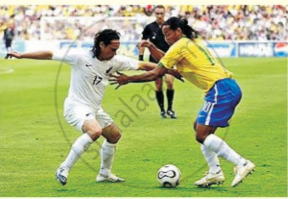Advertisements
Advertisements
प्रश्न
Answer of these question in a short paragraph (30–40 words).
Name the various places and causes for which Evelyn performs.
उत्तर
Evelyn, with a hectic international schedule, gives solo performances at regular concerts. Apart from these, she gives free concerts in prisons and hospitals. She also accords high priority to classes for young musicians.
APPEARS IN
संबंधित प्रश्न
Answer of these question in a short paragraph (about 30 words).
Why was Margie doing badly in geography? What did the County Inspector do to help
her?
Answer these question in 30–40 words.
Where did Bismillah Khan play the shehnai on 15 August 1947? Why was the event
historic?
Tick the right answer.
When we take to something, we find it (boring/interesting).
Behrman has a dream. What is it? Does it come true?
Read and enjoy :
Hockey 
Do you know when hockey was first played? Research in Ethiopia has discovered that it has been around for more than four millenia. A tablet in Greece has images of young people playing field hockey. Even in South America, Ireland, Egypt, Scotland and Rome, there are proofs and records of this game. The game in these countries was no different than the other even though it was known by different names. Hundreds of years ago, this game was known as 'Hockie' in Ireland and it is this name that has stuck with the game ever since.

While current field hockey appeared in the mid-18th century in England, primarily in schools, it was not until the first half of the 19th century that it became firmly established. Prior to 1980, women were not permitted to take part in this game. The first club was created in 1849 at Blackheath in south-east London. During the 1600s and 1700s, hockey in England was a little dissimilar and it was more disorganised. People from all over the village would take part in the game. It was not unusual for a team to have 60 - 100 players. It was the goal of the team players to get the ball into the common ground of the rival team. This game required quite a few days to finish. Many players suffered injuries. Even though umpires were present, they were not allowed to say anything without the team members' request.
Ultimaty , good judgment prevailed. Firm regulations were introduced. In England, a headmaster restricted the number of players to thirty for one single team, During the 1860s, England's Eton College laid down some rules for the game. Additional rules were introduced afterthe formation of the Hockey Association in the year 1875.
Football
Football refers to a number of similar team sports, all of which involve (to varying degrees) kicking a ball with the foot in an attempt to score a goal. People from around the world have played games which involved kicking and / or canying a ball, since ancient times. However, most of the modern codes of football have their origins in England.

The most popular of these sports worldwide is association football, more comm.only known as just 'Football' or 'Soccer'. It is widely considered to be the most popular sport in the world
'All right!' you 'll cry.'All right!' you'll say,
'But if we take the set away,
What shall we do to entertain
Our darling children?Please explain!'
We'll answer this by asking you,
'What used the darling ones to do?
'How used they keep themselves contented
Before this monster was invented?'
Have you forgotten? Don't you know?
We'll say it very loud and slow:
THEY ... USED ... TO ... READ! They'd READ and READ,
AND READ and READ, and then proceed
To READ some more. Great Scott! Gadzooks!
One half their lives was reading books!
The nursery shelves held books galore!
Books cluttered up the nursery floor!
And in the bedroom, by the bed,
More books were waiting to be read!
Read the lines given above and answer the question given below.
Explain with reference to context.
But even as he approached the boy, Mr. Oliver sensed that something was wrong. The boy appeared to be crying. His head hung down, he held his face in his hands, and his body shook convulsively. It was a strange, soundless weeping, and Mr. Oliver felt distinctly uneasy.
Well, what’s the matter, he asked, his anger giving way to concern. What are you crying for? The boy would not answer or look up. His body continued to be wracked with silent sobbing.
Oh, come on, boy. You shouldn’t be out here at this hour. Tell me the trouble. Look up.
Read the extract given below and answer the question that follow.
Why did Mr Oliver’s anger change to concern?
Lights were shining from every window, and there was a savoury smell of roast goose, for it was New-year’s eve—yes, she remembered that. In a corner, between two houses, one of which projected beyond the other, she sank down and huddled herself together. She had drawn her little feet under her, but she could not keep off the cold; and
she dared not go home, for she had sold no matches, and could not take home even a penny of money. Her father would certainly beat her; besides, it was almost as cold at home as here, for they had only the roof to cover them, through which the wind howled, although the largest holes had been stopped up with straw and rags. Her little hands were almost frozen with the cold. Ah! perhaps a burning match might be some good, if she could draw it from the bundle and strike it against the wall, just to warm her fingers. She drew one out—“scratch!” how it sputtered as it burnt! It gave a warm, bright light, like a little candle, as she held her hand over it. It was really a wonderful light. It seemed to the little girl that she was sitting by a large iron stove, with polished brass feet and a brass ornament. How the fire burned! and seemed so beautifully warm that the child stretched out her feet as if to warm them, when, lo! the flame of the match went out, the stove vanished, and she had only the remains of the half-burnt match in her hand.
Read the extract given below and answer the question that follow.
Why could the girl not go home?
Read the extract given below and answer the questions that follow:
Portia: ........But this reasoning is not in fashion to choose me a husband. O me, the word “choose”! I may neither choose who I would nor refuse whom I dislike; so is the will of a living daughter curbed by the will of a dead father. Is it not hard, Nerissa, that I cannot choose one, nor refuse none?
(i) What test had Portia’s father devised for her suitors? What oath did the suitors have to take before making their choice? [3]
(ii) Who is Nerissa? What does she say to cheer up Portia? [3]
(iii) Why does Portia disapprove of the County Palatine? Who would she rather marry? [3]
(iv) How, according to Portia, can the Duke of Saxony’s nephew be made to choose the wrong casket? What do these suitors ultimately decide? Why? [3]
(v) Whom does Portia ultimately marry? Who were the two other suitors who took the test? Why, in your opinion, is the person whom she marries worthy of her? [4]
What information does Gilman give to Twisden? Why did Twisden decide to withdraw from the case ?
What is the beating of the heart compared to ? How is the heart described ? IV/wt does the beating of the heart remind us of?
Answer the following question.
Name two things the elephant can do with his trunk, and two he cannot.
How did Ray communicate with him?
Who reaps the benefits when the wind blows through the trees?
Read the newspaper report to find the following facts about Columbia’s ill-fated voyage.
Date of return journey: ____________
How did the little-bandaged girl make the author much more thoughtful than he ever thought?
What decides the choices made by the rebel?
According to the speaker’s brother, where did the ghost hid himself?
The words helper, companion, partner and accomplice have very similar meanings, but each word is typically used in certain phrases. Can you fill in the blanks below with the most commonly used words? A dictionary may help you.
a faithful …………… such as dog.
Read the following extract from Jesse Owens's short story, ‘My Greatest Olympic Prize’ and answer the question that follows:
| I wasn't too worried about all this. I'd trained, sweated and disciplined myself for six years with the Games in mind. While I was going over on the boat, all I could think about was taking home one or two of those gold medals. I had my eye especially on the running broad jump. |
- What does Owens mean by 'all this'? What games does he refer to? [3]
- What made Owens confident of winning a gold medal or two? [3]
-
What was the ‘surprise’ that Hitler had kept hidden from the world?
How did Owens feel when he came face to face with the ‘surprise’? [3] - Describe Owens’ performance in the broad jump trials.
What doubts filled his mind at this time? [3] - What makes Luz Long’s behaviour at the ‘Games’ truly remarkable in the context of the times?
Identify a theme that is common to the short story ‘My Greatest Olympic Prize and the poem ‘Nine Gold Medals’. [4]
